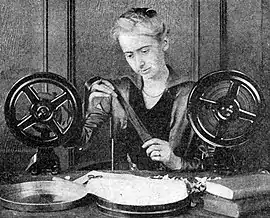Hettie Gray Baker
Hettie Gray Baker (July 12, 1880 – November 14, 1957) was an American film editor.
Hettie Gray Baker | |
|---|---|
 Hettie Gray Baker in 1918 | |
| Born | July 12, 1880 Hartford, Connecticut |
| Died | November 14, 1957 (aged 77) New York state |
| Resting place | Cape Cod, Massachusetts |
| Occupation | Film editor |
| Parent(s) | Josiah Q. Baker Lizzie A. Chipman |
Biography
Born in Hartford, Connecticut, the daughter of Josiah Q. Baker and his wife Lizzie A. Chipman, Hettie attended public high school in Hartford before undertaking a special course of study at Simmons College in Boston. She was employed at the Hartford Public Library during 1900–03, where she began writing movie scenarios during her spare moments. She sold her first story, titled, Treasure Trove, to Vitagraph Studios. for $20 (equivalent to $704 in 2022), and continued to write and sell freelance works for the next six years.[1] In 1903, she became a private secretary for the School for Social Workers in Boston, where she worked until 1907 when she was hired as a librarian for the Hartford Bar Library,[2] a small law library.[3]
In 1913, she was employed by Hobart Bosworth's film company as a story editor.[4] Her work included scenario writing and scripting stories for a series of silent films based upon the work of Jack London. These included Burning Daylight (1914), The Valley of the Moon (1914), and The Chechako (1914).[5] In February 1914, she was one of the co-founders of the Photoplay Authors League – a precursor of the Screen Writers Guild[6] – and during the first year of operation was elected vice president and a member of the board of control.[7]
In 1916, she went to work for Fox Film Corporation (later renamed Twentieth Century Fox) as a film editor.[8] During her first year, she edited A Daughter of the Gods, Hollywood's first film with a million dollar budget,[1] and, listed as H.G. Baker, may have been the first female editor to be acknowledged in a film's credits.[9] She was the editor for Queen of the Sea (1918) starring Annette Kellerman,[9] and The Iron Horse (1924), directed by John Ford.[5] In total, she was a writer and editor for over 20 films, but was rarely credited.[9]
By 1938, Hettie was a movie executive, serving as censor representative for Twentieth Century Fox.[1] Being a cat-lover, later in her life she wrote several books about cats.[5]
Bibliography
- Canting bookplates, 1926
- Cating bookplates, 1926
- Motion picture bookplates, 1930
- Bookplates of Hettie Gray Baker, 1947
- Your Siamese cat, 1951
- 195 cat tales, 1953
References
- "Movie Pioneer", The Sunday Morning Star, Wilmington, Delaware, p. 7, May 1, 1938, retrieved 2013-05-04.
- Leonard, John William, ed. (1914), Woman's Who's Who of America: A Biographical Dictionary of Contemporary Women of the United States and Canada, 1914-1915, New York: American Commonwealth Company, p. 69.
- Smith, Claribel H.; Baker, Hettie Gray (April 1910), "Management of a Small Law Library", Law Library Journal, 3 (1): 1, retrieved 2013-05-04.
- Slide, Anthony (1994), Early American Cinema (2nd ed.), Scarecrow Press, p. 156, ISBN 0810827220.
- Script-writer, MareLibri, retrieved 2013-05-04.
- Pawlak, Debra Ann (2012), Bringing Up Oscar: The Story of the Men and Women Who Founded the Academy, Open Road Media, p. 37, ISBN 978-1453226186.
- Grau, Robert (1914), The Theatre of Science: A Volume of Progress and Achievement in the Motion Picture Industry, New York: Broadway Publishing Company, p. 98.
- "Women At Work: Work History of Women in America", Connecticut History Online, 2008, retrieved 2013-05-04.
- Hettie Gray Baker Rescues Fox Movies from Box Office Disaster, New England Historical Society, 2014, retrieved 2015-12-10.
External links
- Hettie Gray Baker examining a roll of film, Los Angeles, Connecticut Historical Society, retrieved 2013-05-04.
- Hettie Gray Baker at IMDb
- Hettie Gray Baker at Women Film Pioneers Project